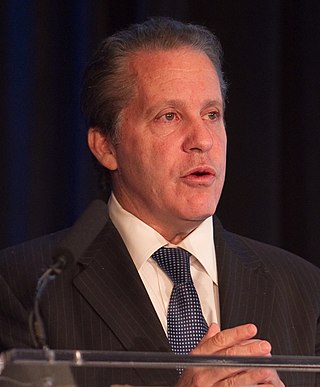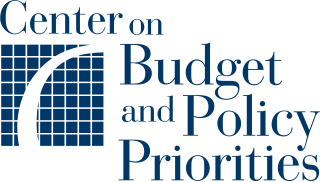
The Children's Health Insurance Program (CHIP) – formerly known as the State Children's Health Insurance Program (SCHIP) – is a program administered by the United States Department of Health and Human Services that provides matching funds to states for health insurance to families with children. The program was designed to cover uninsured children in families with incomes that are modest but too high to qualify for Medicaid. The program was passed into law as part of the Balanced Budget Act of 1997, and the statutory authority for CHIP is under title XXI of the Social Security Act.
The Tax Foundation is an American think tank based in Washington, D.C. It was founded in 1937 by a group of businessmen in order to "monitor the tax and spending policies of government agencies". The Tax Foundation collects data and publishes research studies on U.S. tax policies at both the federal and state levels. Its stated mission is to "improve lives through tax policy research and education that leads to greater economic growth and opportunity".

Eugene Benton Sperling is an American lawyer who was director of the National Economic Council and assistant to the president for economic policy under Presidents Bill Clinton and Barack Obama. He is the only person to serve as national economic advisor under two presidents. Outside of government, he founded the Center for Universal Education at the Brookings Institution in 2002.

The Economic Policy Institute (EPI) is a 501(c)(3) non-profit American think tank based in Washington, D.C., that carries out economic research and analyzes the economic impact of policies and proposals. Affiliated with the labor movement the EPI is usually described as presenting a left-leaning and pro-union viewpoint on public policy issues. Since 2021, EPI has been led by economist Heidi Shierholz, the former Chief Economist of the Department of Labor.
The Clinton health care plan was a 1993 healthcare reform package proposed by the administration of President Bill Clinton and closely associated with the chair of the task force devising the plan, First Lady of the United States Hillary Clinton.
This article concerns proposals to change the Social Security system in the United States. Social Security is a social insurance program officially called "Old-age, Survivors, and Disability Insurance" (OASDI), in reference to its three components. It is primarily funded through a dedicated payroll tax. During 2015, total benefits of $897 billion were paid out versus $920 billion in income, a $23 billion annual surplus. Excluding interest of $93 billion, the program had a cash deficit of $70 billion. Social Security represents approximately 40% of the income of the elderly, with 53% of married couples and 74% of unmarried persons receiving 50% or more of their income from the program. An estimated 169 million people paid into the program and 60 million received benefits in 2015, roughly 2.82 workers per beneficiary. Reform proposals continue to circulate with some urgency, due to a long-term funding challenge faced by the program as the ratio of workers to beneficiaries falls, driven by the aging of the baby-boom generation, expected continuing low birth rate, and increasing life expectancy. Program payouts began exceeding cash program revenues in 2011; this shortfall is expected to continue indefinitely under current law.
The Peterson Institute for International Economics (PIIE), known until 2006 as the Institute for International Economics (IIE), is an American think tank based in Washington, D.C. It was founded by C. Fred Bergsten in 1981 and has been led by Adam S. Posen since 2013. The institute conducts research, provides policy recommendations, and publishes books and articles on a wide range of topics related to the US economy and international economics.

The United States budget comprises the spending and revenues of the U.S. federal government. The budget is the financial representation of the priorities of the government, reflecting historical debates and competing economic philosophies. The government primarily spends on healthcare, retirement, and defense programs. The non-partisan Congressional Budget Office provides extensive analysis of the budget and its economic effects. It has reported that large budget deficits over the next 30 years are projected to drive federal debt held by the public to unprecedented levels—from 98 percent of gross domestic product (GDP) in 2020 to 195 percent by 2050.

Citizens for Tax Justice (CTJ) is a Washington, D.C.-based think tank and advocacy group founded in 1979 focusing on tax policies and their impact. CTJ's work focuses primarily on federal tax policy, but also analyzes state and local tax policies.

The Center on Budget and Policy Priorities (CBPP) is a progressive American think tank that analyzes the impact of federal and state government budget policies. A 501(c)(3) nonprofit organization, the Center's stated mission is to "conduct research and analysis to help shape public debates over proposed budget and tax policies and to help ensure that policymakers consider the needs of low-income families and individuals in these debates."

The Urban-Brookings Tax Policy Center, typically shortened to the Tax Policy Center (TPC), is a nonpartisan think tank based in Washington D.C., United States. A joint venture of the Urban Institute and the Brookings Institution, it aims to provide independent analyses of current and longer-term tax issues, and to communicate its analyses to the public and to policymakers. TPC combines national specialists in tax, expenditure, budget policy, and microsimulation modeling to concentrate on five overarching areas of tax policy: fair, simple and efficient taxation, social policy in the tax code, business tax reform, long-term implications of tax and budget choices, and state tax issues.
The phrase Bush tax cuts refers to changes to the United States tax code passed originally during the presidency of George W. Bush and extended during the presidency of Barack Obama, through:
The Peter G. Peterson Foundation is an American billionaire-funded foundation established in 2008 by Peter G. Peterson, former US Secretary of Commerce in the Nixon Administration and co-founder of the Blackstone Group, an American financial-services company.
The America's Healthy Future Act was a bill proposed by Democratic Senator Max Baucus of Montana, who chaired the Senate Finance Committee, on September 16, 2009. It is also colloquially known as the Baucus Health Bill, the Baucus Health Plan, or BaucusCare. Baucus initially publicly released a 223-page summary of the proposal. It started going through the Senate mark-up process on September 22. That amendment process finished Oct. 2, and was passed by the Finance Committee on October 13 by a 14 to 9 vote,. An October CBO report stated that enacting the proposal would, on net, end up reducing the federal deficit by $81 billion over the 2010–2019 period.

The Affordable Care Act (ACA), formally known as the Patient Protection and Affordable Care Act and colloquially known as Obamacare, is a landmark U.S. federal statute enacted by the 111th United States Congress and signed into law by President Barack Obama on March 23, 2010. Together with the Health Care and Education Reconciliation Act of 2010 amendment, it represents the U.S. healthcare system's most significant regulatory overhaul and expansion of coverage since the enactment of Medicare and Medicaid in 1965.
The National Commission on Fiscal Responsibility and Reform was a bipartisan Presidential Commission on deficit reduction, created in 2010 by President Barack Obama to identify "policies to improve the fiscal situation in the medium term and to achieve fiscal sustainability over the long run". The 18-member Commission, consisting of 12 members of Congress and six private citizens, first met on April 27, 2010. A report was released on December 1, recommending a combination of spending cuts and tax increases.

The Institute on Taxation and Economic Policy (ITEP) is a non-profit, liberal think tank that works on state and federal tax policy issues. ITEP was founded in 1980, and is a 501(c)(3) tax-exempt organization.

The Path to Prosperity: Restoring America's Promise was the Republican Party's budget proposal for the federal government of the United States in the fiscal year 2012. It was succeeded in March 2012 by "The Path to Prosperity: A Blueprint for American Renewal", the Republican budget proposal for 2013. Representative Paul Ryan, Chairman of the House Budget Committee, played a prominent public role in drafting and promoting both The Path to Prosperity proposals, and they are therefore often referred to as the Ryan budget, Ryan plan or Ryan proposal.

The political positions of Paul Ryan, the U.S. representative from Wisconsin's 1st congressional district from 1999 to 2019 and the 54th speaker of the United States House of Representatives from 2015 to 2019, were generally conservative, with a focus on fiscal policy. Ryan was Chairman of the House Budget Committee from 2011 to 2015 and of Ways and Means in 2015. Ryan was the Republican nominee for Vice President as the running mate of Mitt Romney in the 2012 presidential election.

The American Health Care Act of 2017 was a bill in the 115th United States Congress. The bill, which was passed by the United States House of Representatives but not by the United States Senate, would have partially repealed the Affordable Care Act (ACA).











